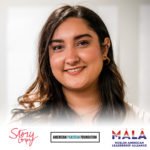*This story was produced in partnership with StoryCorps and American Pakistan Foundation (APF).
I am here with the American Pakistan Foundation. I’ve been involved in various capacities with APF. I started out just as an intern and volunteer for about two years. And then from there, I had the opportunity to apply to the fellowship program in 2018 where I spent two months in Pakistan focusing on rural development and education. Then from there, I’m now a part of their leadership council and I continue to volunteer with the organization and help out in any way I can. So I identify as Pakistani, and I identify as American, that’s how I usually introduce myself. It depends on of course where I am. If I’m in America, it’s understood that I’m probably American, so I’ll introduce myself as Pakistani. If I’m outside of the US I’ll introduce myself as American Pakistani and to me kind of like wealth and a gift to be from both places.
So I get to pull from my American identity and that unique experience, but I also get to pull from my Pakistani one. I think people might have a stereotype associated with Pakistan. And I think that has to do with the lack of knowledge about how diverse the country is. So it’s kind of assumed that if you are a Pakistani-American then you’re Muslim. When in the case Pakistan does have quite a few different religious backgrounds throughout the country. The fellowship program allowed me to create lasting ties with people on the ground in Pakistan. So before, my only reasons to go back to the country were to visit my own family and I never really got outside of that kind of safe zone. But now I actually have professional reasons to go back to Pakistan as well that I’ve developed like without my family and outside of that kind of comfort zone.
So now, for example, I had focused on education while I was there. So if I wanted to continue to pursue something in that field or engage in some kind of project for educational development in rural communities in Pakistan, I’m now equipped with the tools to reach out to the right people. So that I think is the most defining moment where I was like, wow, you know, I’m making a change. I’m impacting an organization being a PF. So I pride myself in coming from a line of very, very strong women. And that is also a preconceived notion that maybe people have is that if you’re Muslim and you’re a woman, then maybe you’re not, you’re not as outgoing or maybe you’re meek or you’re not allowed for whatever reason to pursue a career or anything like that. And my grandmother and I think my family really, really supported me in that sense where it wasn’t an option for me to go to school.
It was like, you’re going to school, you’re getting a job, you’re going to work. But they also allowed me a sense of freedom to move around in that space. So I’m sure you’ve heard before, it’s often associated with, you know, immigrant children. You have three career options. You can be a doctor, a lawyer, an engineer. And what I’m really thankful for is my grandmother. She is actually an actress. She was an actress in Pakistan. She came in dramas and PTV. And then my grandfather worked in radio Pakistan, so they came from I guess different, not as popular professions. And they really implemented that in their children and they really wanted all of us and their grandchildren to pursue careers of their choice and careers that they thought were beneficial. And so I think the reason why I’ve been able to do these kinds of things is that I have that support system that helps me realize my own potential.
I like to think of myself as a product of this APF pipeline in this community. I started in APF the summer after my freshman year of college and this was after working for the Pakistan mission to the united nations. So that was a very different role. And working for an NGO I think gave me the opportunities to pursue my own interests, in this way. And it wasn’t as necessarily structured as a UN internship would’ve been. So one of the benefits of APF is taking advantage of the people that are involved in the organization. So a lot of the board members we have are highly successful people in their field. But besides that, it’s also the volunteers that you’re around. So it’s almost like self-selective. So the people who are involved in APF, you find out how a lot of the same interests that you do, and it’s kind of like an incubation where you bounce ideas off of each other and then you can develop programs like this fellowship program. So that was an amazing part of working with the organization. So whatever I do in the future, whether it be in academia or in my professional life, I really hope that whatever work I leave behind, people can tell that I was passionate about it. But in terms of human to human connections, I think compassion and understanding are two of the most important values. And I think I’ve learned that from my family as well.


